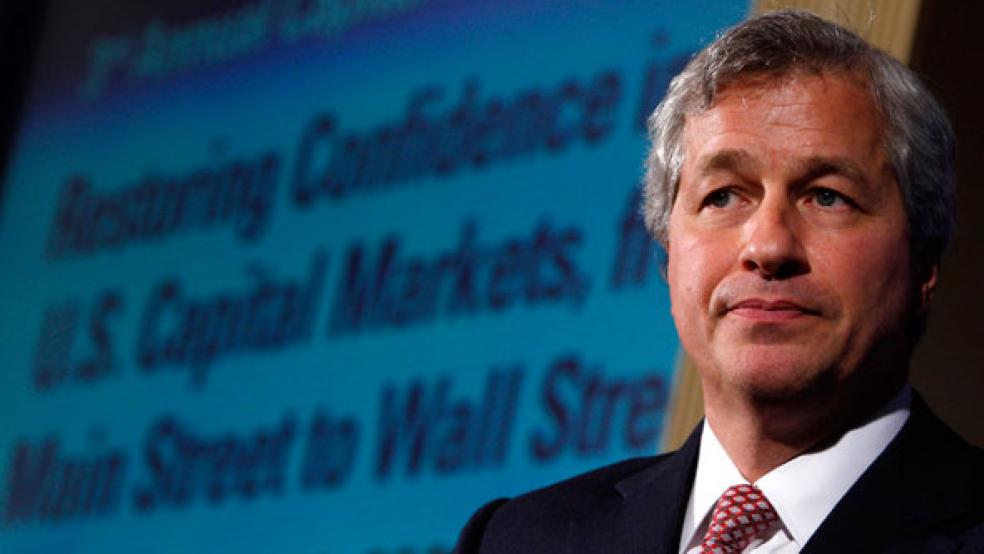Would it really make that much of a difference to J.P. Morgan Chase (NYSE: JPM) if Jamie Dimon had to relinquish the post of chairman and settle for being just the bank’s CEO?

The Fiscal Times FREE Newsletter
Certainly, the growing ranks of those trying to oust him believe it would. A number of activist shareholder groups are leading the charge in support of a non-binding proposal to relieve Dimon of the chairman’s title. A similar ballot initiative at last year’s annual meeting, which took place after the revelation of the “London Whale” trading losses that ultimately cost the bank more than $6 billion, won the support of 40 percent of those who cast their votes. This year’s proposal, now that the full magnitude of the trading losses is clear and with recent Congressional and internal bank reports highlighting some unnerving revelations about JP Morgan’s risk management, will almost certainly earn the backing of a larger percentage of shareholders.
RELATED: Why JPMorgan’s Risk Management Failed
The board wouldn’t have to listen to what those shareholders say, of course: It’s up to the directors to choose who serves as their chair, just as it is their task to decide who should be the bank’s CEO. But the pressure on them to act is bound to intensify: Corporate governance advocates say separating the duties of the CEO and the chairman is the “best practice.” In the wake of the London Whale fiasco, it is increasingly hard for the board to argue that its governance and oversight are impeccable.

Ahead of the vote, Dimon’s own demeanor has undergone a radical shift. Famously (or infamously, depending on your perspective), he initially dubbed the London Whale debacle as merely “a tempest in a teapot.” This year, his letter to shareholders began with a much more humble and even sheepish acknowledgment of the many ways in which the bank fell short in its handling of the matter.
It was, Dimon wrote, “the stupidest and most embarrassing situation I have ever been a part of” and that “I take personal responsibility for what happened.” More intriguingly, given Dimon’s famous (or infamous) resistance to new banking regulations, he declared that, “I feel terrible that we let our regulators down” and that “these problems were our fault, and it is our job to fix them.” He even appeared reconciled to the Dodd-Frank Act, and the greater level of oversight that on previous occasions had brought him to the brink of apoplexy. “We believe the new authorities under Dodd-Frank ... create the conditions to eliminate too big to fail,” Dimon wrote. “Clearly, more work needs to be done, but we are collaborating closely with the regulators to accomplish this goal.”
RELATED: Meet the Man Who Could End ‘Too Big to Fail’
Occasionally, the tone in Dimon’s annual letter does shift in the direction of the self-congratulatory, as when he reassures investors that “we don’t blame the messenger here”; reminds shareholders that “we took strong action with those who were directly and indirectly involved” in the London Whale scandal, firing them and clawing back bonus payments, and that the bank promptly communicated to stakeholders that it had been wrong in its initial assessment of the magnitude of the Whale problem. That’s more like the Jamie Dimon we have become accustomed to hearing – or any other bank CEO for that matter.
If the bank can really learn the lessons that it spells out -- fight complacency, don’t just trust but verify by enabling and encouraging employees to question assumptions, ensure that risk limits are appropriate to the activities being undertaken -- then Dimon’s critics would have a lot less to worry about. But as the banking industry has demonstrated over and over again (in line with human nature, for that matter), the best intentions shaped in the immediate aftermath of a crisis rarely endure once the events that precipitated the crisis have passed from immediate memory. The only question is how long that process takes, and the answer tends to be directly correlated with the magnitude of the problem. That’s why the Glass-Steagall Act, passed in the aftermath of the 1929 crash and the banking industry’s collapse in the 1930s, endured for the best part of six decades and also why we saw its powers eroded steadily throughout the last decade of its official existence.
In other words: Be wary of treating Dimon’s latest lengthy and apparently heartfelt mea culpa as a sign of a real transformation. In the wake of its missteps in recent years, JPMorgan Chase has acquired some powerful opponents, and their number is only growing as the bank catches up to Goldman Sachs (NYSE: GS) in the Wall Street unpopularity sweepstakes.
It isn’t just the non-binding shareholder vote that is looming, but the prospect of regulation out of Washington that may be even tougher than the new Basel III capital standards. Senators Sherrod Brown of Ohio and David Vitter of Louisiana are pushing new legislation that would require banking behemoths with more than $400 billion in assets to take an extra capital surcharge of 5 percent. In a word – ouch. Even if the Brown/Vitter bill doesn’t win support, the mood in Congress is clearly increasingly hostile when it comes to the ‘too big to fail’ phenomenon – of which JP Morgan is a prima facie example. Since Attorney-General Eric Holder publicly acknowledged that big banks may be too big to hold accountable for their missteps without threatening the financial system, Congress appeared to develop a fresh resolve to tackle the issue. Dodd-Frank is bad enough, in Dimon’s eyes; more draconian measures would make it even tougher to generate a profit for his shareholders.
To go back to the original question – whether it would make a significant difference to the banking system if Jamie Dimon were deprived of his position as the company’s chairman – the answer is probably not, at least in the short term. It’s unlikely that any replacement in that role would challenge Dimon’s overall leadership or come close to his knowledge and understanding of the institution he has built. After all, the bank will hardly recruit Former Fed Chairman Paul Volcker or Sen. Bernie Sanders for the post. But with all the uncertainty surrounding how banks will be regulated and what businesses they will be allowed to pursue, including all the fresh oversight of their risk management policies and practices, it’s logical that Dimon doesn’t want to relinquish one iota of his power or send out the slightest sign that he is vulnerable. Hence the tone of his letter to shareholders: eating a little slice of humble pie voluntarily today is infinitely preferable to having an entire one flung into your face tomorrow.






